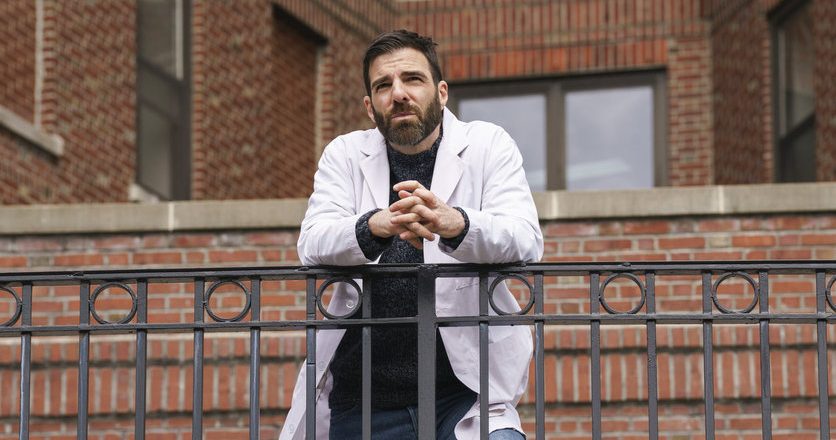Maybe you’re familiar with Oliver Wolf Sacks. Before he died in 2015, he was a neurologist who wrote about the strange and fascinating nuances of the brain for The New Yorker magazine, as well as in nonfiction books including “Awakenings” and “The Man Who Mistook His Wife for a Hat.”
Or maybe you’re just in the mood for a medical drama a lot like “House” but … not “House.”
Toss those two ideas together you have the premise for NBC’s “Brilliant Minds,” which is far better than anticipated despite a title that is boringly generic but also uncomfortably similar to “A Beautiful Mind.”
Well, not all titles can be bangers. But the show itself comes awfully close.
The first episode drops you into the world of a Bronx hospital, where Dr. Oliver Wolf (Zachary Quinto) and his interns solve the neurological mysteries ailing their patients. There’s no sludgy exposition needed — you instantly understand the show’s premise.
Except — whoops — as I watched subsequent screeners, I realized I had somehow started with Episode 3. What an interesting and unintentional experiment, one that left me thinking: How do I tell NBC they should have ditched their pilot (which over-explains everything) and started with Episode 3 instead?
More precisely, someone at the network should have realized you lead with your strongest episode and go from there. The pilot isn’t bad, but it isn’t persuasive either. I’ve seen the first six episodes and recommend picking up “Brilliant Minds” a couple of episodes in, once it finds its footing. You won’t be lost because “Brilliant Minds” really is — no exaggeration — following the “House” template, with a slightly less cranky man at its center.
But the similarities are too numerous to overlook. Wolf is an iconoclast with blazing self-confidence and disrespect for rules or authority. He’s unorthodox, unapologetic and often exasperating to everyone, which includes his best friend (the Wilson equivalent here is a psychiatrist played by Tamberla Perry); his boss (the scolding Cuddy figure is not only Wolf’s supervisor but his mother as well, played by Donna Murphy); and brood of young duckling doctors trailing after him.
Is this more evidence that Hollywood has become creatively bankrupt in recent years? Maybe. And yet none of these similarities to “House” bother me because the show is good. So yes, Wolf’s dialogue could just as easily be coming from “House” star Hugh Laurie, but instead it comes from the mouth of Quinto, who puts his own swaggering if less cantankerous spin on it. He speaks softly but his voice has so much resonance to it that you listen. It’s a terrific reinterpretation of the archetype and Quinto has found room to create a character who feels like his own person.
In one episode, he swallows down the same street drug as his patient to better understand her state of mind. He’s done this kind of thing before, he’s not worried! “Doctors so often prescribe meds without fully understanding their impact — I like to know what my patients are experiencing firsthand.” Who needs standards? Wolf knows what he’s doing! It’s outrageous. But as a story gambit, entertaining.
The group of interns is better than you usually get in this sort of thing, and they alternate between admiration for, and irritation with, Wolf. Occasionally there’s a witty choice in how a moment is shot (the team hears singing in the hospital and they collectively lean into frame, confused). Even in the early going, they feel like individual and three-dimensional personalities. It’s such a comforting fantasy, of doctors bending over backwards to find out what’s wrong, rather than coming up empty and telling their patients to come back if things get worse. Frequent flashbacks to Wolf’s childhood are less effective, but overall the show employs some sophistication in how it weaves this into each episode. The moments are usually related to the case at hand and they provide Wolf with a backstory and suggest how and why he became such an eccentric adult.
Wolf may be straightforward and blunt, but he’s also aware that other people have feelings and he can usually follow basic social cues when it comes to one-on-one conversations. If that sounds like a letdown from House’s unbothered obviousness and bitter insults, it’s not. Wolf is occasionally erratic too, but he’s also just fundamentally interesting, and the characterization works as well as it does thanks to both Quinto’s performance and the writing under the supervision of showrunner Michael Grassi (whose credits include “Supergirl” and “Riverdale”). The medical mysteries are compellingly odd, but really it’s the storytelling itself that’s solid. There are too many newer procedurals lacking this skill, and it stands out that “Brilliant Minds” doesn’t. The show has a real understanding of how episodes need to be paced, and they are filled with the right amount of character-building when it comes to each week’s patients, and enough bit-by-bit progress as the doctors investigate and bounce theories off one another. The stories are rich, rather than perfunctory.
Mostly, though, the show doesn’t feel nervous about viewer attention spans and it has created a world I look forward to revisiting week to week.
“Brilliant Minds” — 3 stars (out of 4)
Where to watch: 9 p.m. Mondays on NBC
Nina Metz is a Tribune critic.

